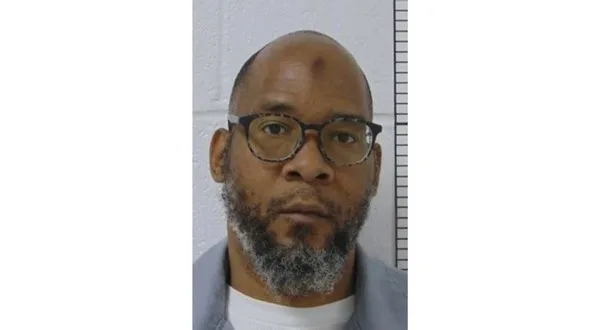
This undated booking photo provided by the Missouri Department of Corrections shows Marcellus Williams. (Photo courtesy of Missouri Department of Corrections via Associated Press)
ST. LOUIS (AP) – The St. Louis County Prosecuting Attorney’s Office will appeal to the Missouri Supreme Court a judge’s ruling upholding the conviction and death sentence for Marcellus Williams, whose execution is one week away.
A notice of appeal filed Monday night did not include any details about the basis for the appeal.
Meanwhile, a clemency petition to Gov. Mike Parson emphasizes how relatives of the murder victim oppose the execution of Williams. And attorneys for Williams on Tuesday asked a federal court to reconsider a previous denial of an appeal alleging that Black prospective jurors were not selected for Williams’ 2001 criminal trial because of their race. Williams is Black.
Williams, 55, is set to die by injection Sept. 24 for the 1998 stabbing death of Lisha Gayle inside her home in University City, Missouri. It would be the third execution in Missouri this year and the 14th nationwide.
Democratic St. Louis County Prosecuting Attorney Wesley Bell cited questions about DNA evidence on the murder weapon in requesting a hearing challenging Williams’ guilt. Bell said the evidence indicated that someone else’s DNA was on the butcher knife used to kill Gayle, but not that of Williams.
But days before an Aug. 21 hearing, new testing showed that the DNA evidence was spoiled because members of the prosecutor’s office touched the knife without gloves before the original trial in 2001.
With the DNA evidence unavailable, Midwest Innocence Project attorneys working on behalf of Williams reached a compromise with the prosecutor’s office: Williams would enter a new, no-contest plea to first-degree murder in exchange for a new sentence of life in prison without parole.
Judge Bruce Hilton signed off on the agreement, as did Gayle’s family. But at Republican Attorney General Andrew Bailey’s urging, the Missouri Supreme Court blocked the agreement and ordered Hilton to proceed with an evidentiary hearing.
Hilton ruled on Sept. 12 that the first-degree murder conviction and death sentence would stand.
“Every claim of error Williams has asserted on direct appeal, post-conviction review, and habeas review has been rejected by Missouri’s courts,” Hilton wrote. “There is no basis for a court to find that Williams is innocent, and no court has made such a finding.”
The Midwest Innocence Project provided The Associated Press with a copy of the clemency petition that asks Parson to spare Williams’ life. Parson, a Republican and a former county sheriff, has been in office for 11 executions, and he has never granted clemency.
The petition focuses heavily on how Gayle’s relatives want the sentence commuted to life without parole.
“The family defines closure as Marcellus being allowed to live,” the petition states. “Marcellus’ execution is not necessary.”
A spokesman for Parson said in an email Tuesday that attorneys for the governor’s office have met with Williams’ legal team, and Parson will announce a decision later, typically at least a day before the scheduled execution.
At the August hearing, Assistant Attorney General Michael Spillane said that DNA evidence aside, other evidence pointed to his guilt.
“They refer to the evidence in this case as being weak. It was overwhelming,” Spillane said.
Also at the hearing, the man who prosecuted Williams, Keith Larner, was asked why the trial jury included just one Black juror. Larner said he struck just three potential Black jurors, including one who he said looked like Williams.
Hayley Bedard, a spokesperson for the Death Penalty Information Center, said there have been no verified instance of an innocent person being executed in the U.S. since capital punishment was reintroduced in 1972, but there have been nearly two dozen people executed “despite strong and credible claims of innocence.”
Prosecutors at Williams’ original trial said he broke into Gayle’s home on Aug. 11, 1998, heard water running in the shower, and found a large butcher knife. When Gayle came downstairs, she was stabbed 43 times. Her purse and her husband’s laptop were stolen.
Authorities said Williams stole a jacket to conceal blood on his shirt. Williams’ girlfriend asked him why he would wear a jacket on a hot day. The girlfriend said she later saw the laptop in the car and that Williams sold it a day or two later.
Prosecutors also cited testimony from Henry Cole, who shared a cell with Williams in 1999 while Williams was jailed on unrelated charges. Cole told prosecutors Williams confessed to the killing and offered details about it.
Williams’ attorneys responded that the girlfriend and Cole were both convicted of felonies and wanted a $10,000 reward.
Williams has been close to execution before. In August 2017, just hours before his scheduled death, then-Gov. Eric Greitens, a Republican, granted a stay after reviewing the same DNA evidence that spurred Bell’s effort to vacate the conviction.
A change.org petition signed by 525,000 people calls for a halt to the execution.
WebReadyTM Powered by WireReady® NSI










